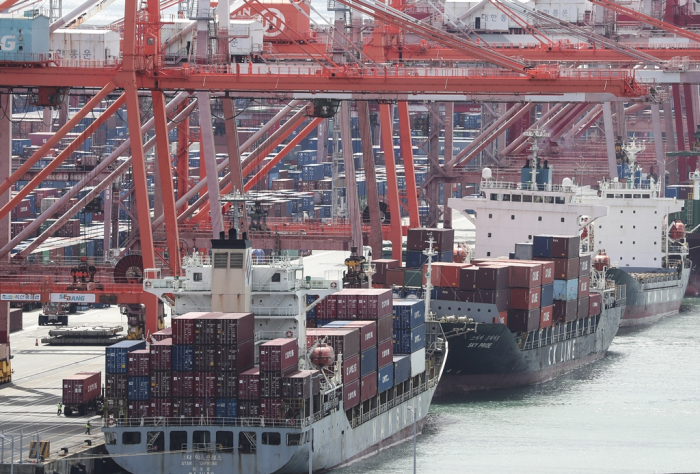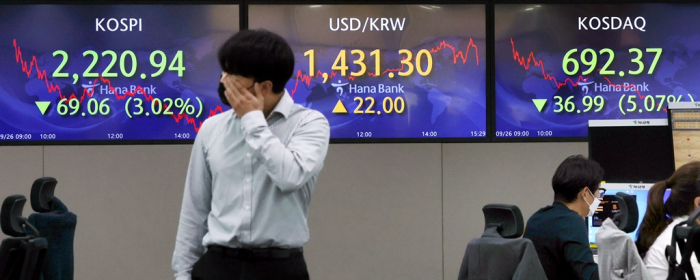Economy
Sinking won fans doubts over Korea’s economic fundamentals
Slowing exports, sluggish corporate earnings may continue to haunt the won; hawkish Fed, weak Chinese economy also negatives
By Sep 29, 2022 (Gmt+09:00)
4
Min read
Most Read
MBK’s Korea Zinc takeover attempt to spur search for white knights


Korea Zinc, MBK face proxy war for zinc smelter


Korea Zinc shares skyrocket after buybacks in tender offer


Lotte to liquidate rubber JV in Malaysia, sell overseas assets for $1 bn


Samsung to unveil 400-layer bonding vertical NAND for AI servers by 2026



The tanking South Korean won currency has stoked doubts over the fundamentals of Asia’s fourth-largest economy, although the government continues to assure investors that the country does not have any major risks to long-term growth.
The won lost 7.1% against the dollar in the first 28 days of the month, underperforming even the British pound, which skidded 5.7% pressured by the UK government’s massive tax cuts. The won’s depreciation was larger than a 4.2% drop in the Chinese yuan, as well as a 2.9% loss and a 2.1% fall in the Japanese yen and the euro, respectively.
The South Korean unit, the worst performer among emerging Asian currencies with a 17.4% slide versus the greenback so far this year, has been more sensitive to bearish factors such as aggressive US interest rate hikes than other currencies.
This has led to growing doubts over South Korea’s economic fundamentals among investors, analysts said. The government should not blame external factors or speculation for the won’s weakness, they added.
SLOWING EXPORTS
The won has been under pressure as exports slowed on sluggish overseas sales of major products.
Exports fell 8.7% in the first 20 days of September from a year earlier with shipments of automobiles and steel products down 7.5% and 31.6%, respectively, suggesting the weaker won will not help the economy weather a global economic downturn.
South Korea is home to major global carmaker Hyundai Motor Co. and the world’s No. 6 steelmaker POSCO. Semiconductor exports grew only 3.4%.
The country relies on foreign demand more than other nations with exports making up 35.6% of its gross domestic product (GDP) last year. That compares with 19% of China and 14.7% of the UK. Japan’s exports accounted for 12.7% of its GDP in 2020.
“The outlook of the export-oriented South Korean economy is getting gloomier, accelerating the won’s depreciation,” said Moon Hong-cheol, an economist at DB Financial Investment.
SLUGGISH CORPORATE EARNINGS
Local companies’ poor earnings put pressure on the won. Operating profits of the listed firms were estimated to total 61.2 trillion won ($42.6 billion) in the third quarter, down 7.2% from a year earlier and 10.5% compared to the previous three months, according to financial market researcher FnGuide Inc.
“Weaker earnings of local companies, which support the South Korean economy, will have a direct impact on the whole economy,” said Yonsei University’s economics professor Sung Taeyoon. “Falling profits are also likely to spur capital outflows, adding to downward pressure on the won.”
Foreign investors have sold a net 10.4 trillion won in shares so far this year on the main Kospi after dumping a net 26 trillion won in 2021, according to data from the Korea Exchange.

Corporate sentiment deteriorated with the Bank of Korea’s business survey index for all industries down to 78 for September, the lowest since February 2021, according to central bank data on Thursday.
“Falling key product prices, a weaker won, sluggish consumer sentiment on high inflation and other factors had an impact on business sentiment,” said a BOK official.
Domestic demand, which had led the economic growth in the first half, is expected to shrink for the time being.
Local consumers also remained gloomy as the BOK’s composite consumer sentiment index for September was 91.4, staying below the threshold of 100 for a fourth straight month, which indicated pessimists outnumbered optimists.
EXTERNAL FACTORS MAY FURTHER WEAKEN WON
The Federal Reserve is expected to raise interest rates by 75 basis points again in November, adding to forecasts that South Korea’s borrowing costs are likely to stay lower than those of the US for longer.
BOK Governor Rhee Chang-yong signaled another 50-basis-point rate increase, but such an aggressive tightening could drag economic growth lower.
The won remained vulnerable to a weaker Chinese yuan and a slowdown in China’s economy, South Korea’s top overseas market. The World Bank earlier this week slashed its economic growth forecast for China this year to 2.8% from the previous prediction of 5% due to Beijing’s strict “zero-COVID” policy.
The outlook on South Korea’s economy is also sluggish.
Fitch Ratings forecast Korea's GDP growth to slow to 2.6% this year and 1.9% in 2023 from 4.1% last year.
“The sharp slowdown in global growth, along with consumption-switching to services, will weigh on Korea's exports and facilities investment,” the rating agency said on Wednesday.
Write to Mi-Hyun Jo at mwise@hankyung.com
Jongwoo Cheon edited this article.
More to Read
-
 Foreign exchangeKorean won at fresh low since global financial crisis as markets crash
Foreign exchangeKorean won at fresh low since global financial crisis as markets crashSep 26, 2022 (Gmt+09:00)
2 Min read -
 Central bankBOK chief signals another big step as Fed hike haunts won
Central bankBOK chief signals another big step as Fed hike haunts wonSep 22, 2022 (Gmt+09:00)
5 Min read -
 EconomyADB cuts Korea’s 2023 growth outlook as trade in deficit for sixth month
EconomyADB cuts Korea’s 2023 growth outlook as trade in deficit for sixth monthSep 21, 2022 (Gmt+09:00)
3 Min read
Comment 0
LOG IN


